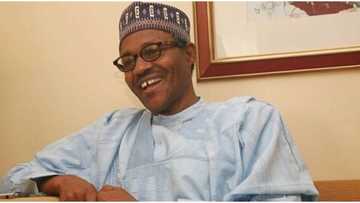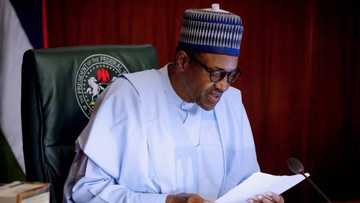Fact-Check: 6 Key Economic Indicators Fault Buhari's Claim, Nigerian Economy is Better Under him Since 2015
- President Muhammdu Buhari in a recent interview made a bold claim that the Nigerian economy has done better under his administration than he met it in 2015
- He noted that by the time he leaves, the next president will have a better economy to manage and continue from where he stopped
- Despite this claim, data using economic indicators of GDP, unemployment among others, Legit.ng attempt to fact-check the president's claim
PAY ATTENTION: Click “See First” under the “Following” tab to see Legit.ng News on your Facebook News Feed!
President Muhammadu Buhari in the last few days has got Nigerians, experts, industrialists and economists talking after making a bold claim on Nigeria's growing economy has done better under his administration.
Speaking to Bloomberg, Buhari also said he will be leaving Nigeria in better shape than it met it in 2015 when he came to power.
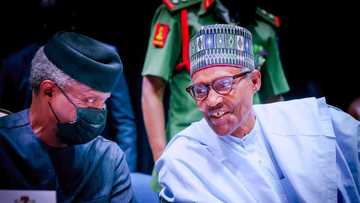
Read also
Nigeria’s poverty rate has increased in the last 6 years, showing men getting poorer than women, report says
Giving different indicators, the president also stressed on how corruption is less hidden and terrorism funding has been eliminated.
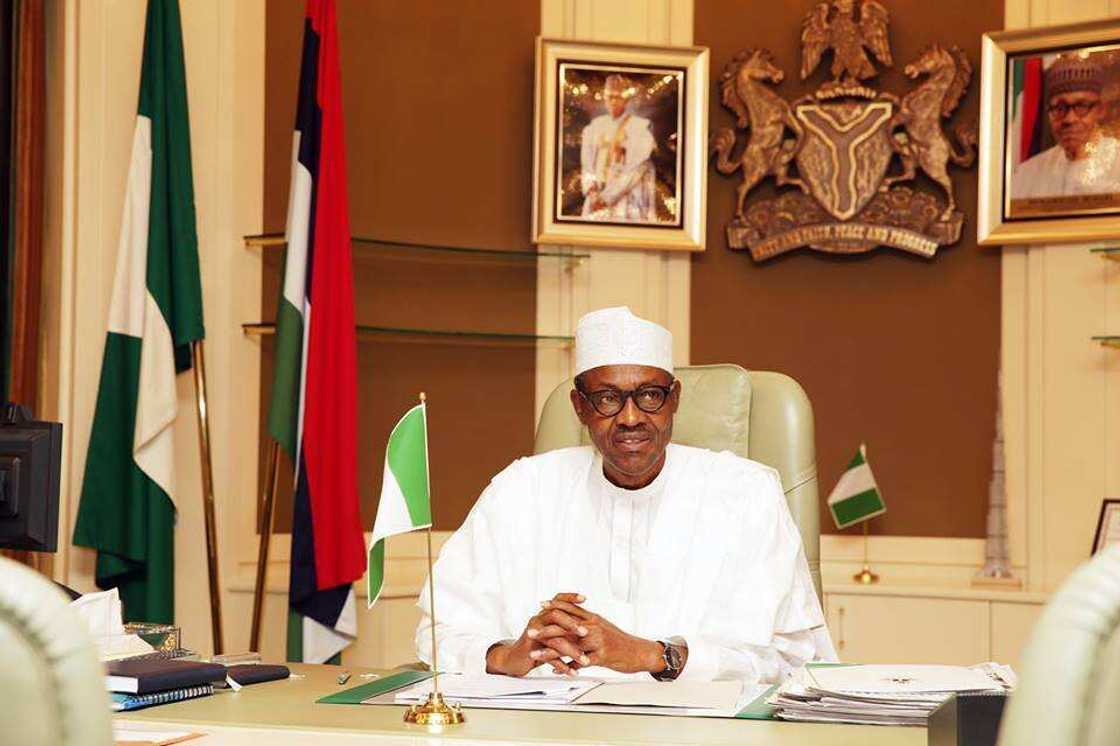
Source: Twitter
Buhari also added that his administration's infrastructure development sets the country on course for sustainable and equitable growth.”
PAY ATTENTION: Share your outstanding story with our editors! Please reach us through info@corp.legit.ng!
Verdict on Buhari's economic exploit
However, a check by Legit.ng using six economic indicators fails to back up the President's claim of a better economy.
In fact, the indicator used showed that the Nigerian economy is far more under pressure than it has ever been.
The economic indicators
According to Investopedia, an economic indicator is a macroeconomic measurement used by analysts to understand current and future economic activity and opportunity.
These criteria include inflation, debt level, exchange rate, Gross Domestic Product (GDP), employment rate and distribution of natural resources which includes crude oil.
Inflation
Data obtained from the National Bureau of Statistics (NBS) showed that when President Buhari took power, Nigeria’s inflation rate closed the year 2015 at a single digit of 9.01 per cent. Since then inflation figures have skyrocketed.
- 2016- 15.68%
- 2017- 16.52%
- 2018-12.09%
- 2019- 11.40%
- 2020- 15.75%
- 2021- 15.63%
- The latest is 17.71% in the month of May 2022
In fact, food price which is a major component of determining the poverty level of a country’s population has increased by over 130% since 2015.
Food inflation was 8.4 percent in the first quarter of 2015, and the last figure as at May 2022, it sthe tands at 19.5 percent.
Debt
On debt level, as of 2015 before President Buhari took over power, Nigeria’s debt revenue stood at N8.8 trillion, according to the Debt Management Office.
However, recent statistics from the DMO showed that Nigeria’s debt has skyrocketed to N41 trillion as at June 2022. This represents an increment of over 500 per cent.
Fuel prices
Fuel Pump prices were N87 per litre when the Buhari administration took office. It was N165 per litre today.
Exchange rate
As at Janaury 2015, CBN data for Bureau de Change Operators shows Naira exchanged at N196.13 to a dollar.
Since the ban on BDC dollar sales by the CBN, the exchange rate of the Naira to the dollar as risen to N616/$ at the peer-to-peer forex market as at Thursday, June 23, 2022.
According to the World Bank, to live above poverty, a Nigerian needs $1.90.
Using this number from 2015, a Nigerian will need N372.647 to live above poverty, but N1170.4 in 2022.
Unemployment
Nigeria’s unemployment rate in the last quarter of 2015 stood at 10.4 per cent according to the National Bureau of Statistics. The figure went up to 14.2 per cent at the end of 2016.
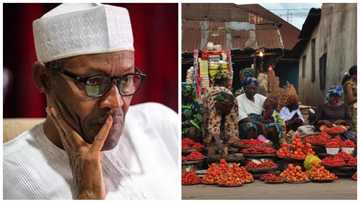
Read also
Economists raise concerns about Nigerians' survival as inflation jumps to 11-month high, hits 17.71 per cent
At the end of 2017, it moved up to 20.42 per cent. It moved up to 23.1 per cent in 2018 and the latest figures from the NBS indicate that the unemployment rate now stands at 33.3 per cent.
Gross Domestic Product
A breakdown of the GDP figures from the National Bureau of Statistics and the World Bank from 2015 to 2020 shows that Nigeria’s GDP in 2015 when President Buhari assumed office stood at $486 billion.
The GDP figures were estimated to have risen to $440 billion in 2021, with 3.98% growth of the economy even though official figures by the World Bank are still being expected.
On percentage growth, the Nigerian economy grew by 2.79%, it ended 2021 at a growth rate of 3.4 per cent 2021, the strongest since 2014.
According to the World Bank, in order to erase poverty, the Nigerian economy must outrun population growth which is presently projected at 3.6%.
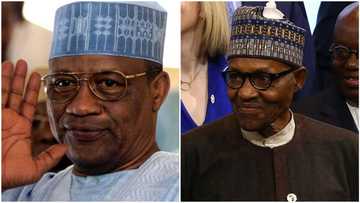
Read also
List: Buhari's successor, June 12 annulment and 4 other crucial points IBB raised about state of the nation
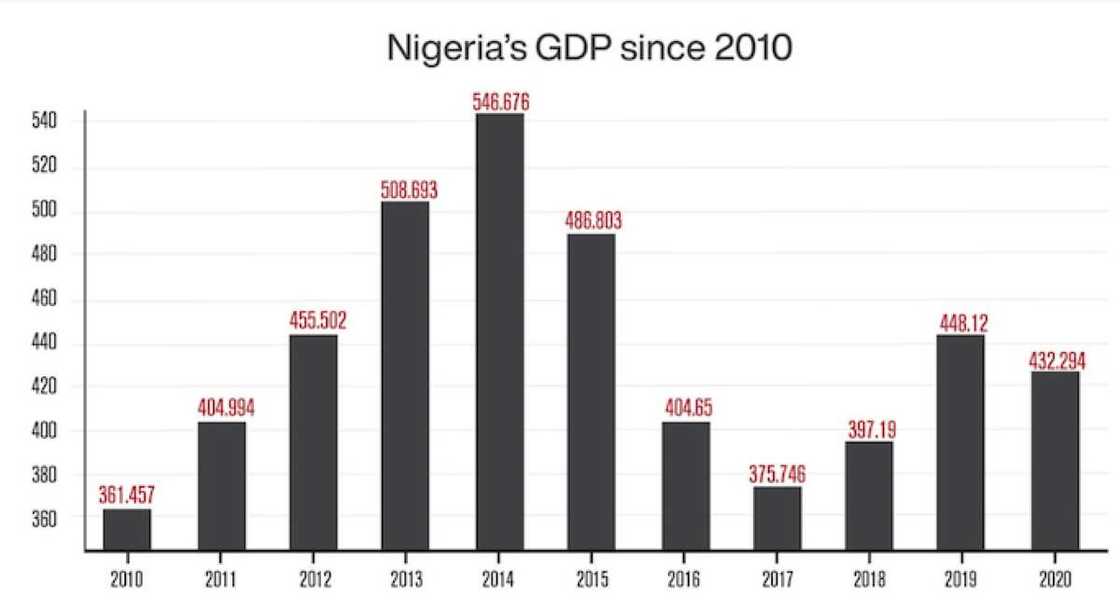
Source: Facebook
Conclusion
Using the key economic parameters that determine if an economy is in a good shape, the claim by President Buhari that he is leaving a better economy for Nigerians is false.
World Bank disagrees with FG on 2022 economy growth prediction of 4.2%
In another report, The federal government projects that the economy will rise by 4.2% in its recently signed 2022 budget
However, World Bank believes it will in-fact grow by 2.5 growth giving various reasons for its prediction.
Defending the expected growth rate, Minister of Finance, Zainab Ahmed believes the expected 2022 economic growth will lift many Nigerians out of poverty
Source: Legit.ng


